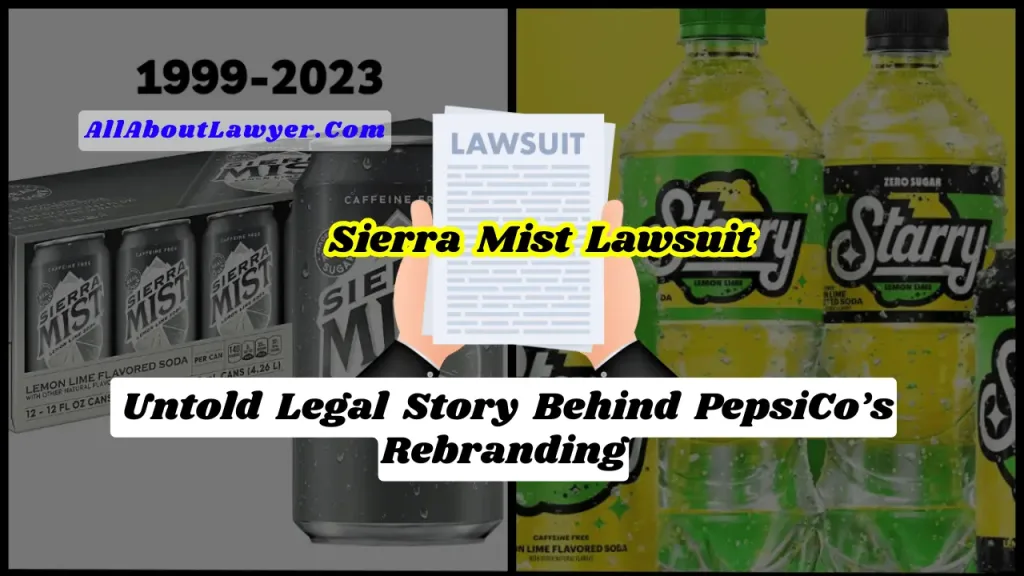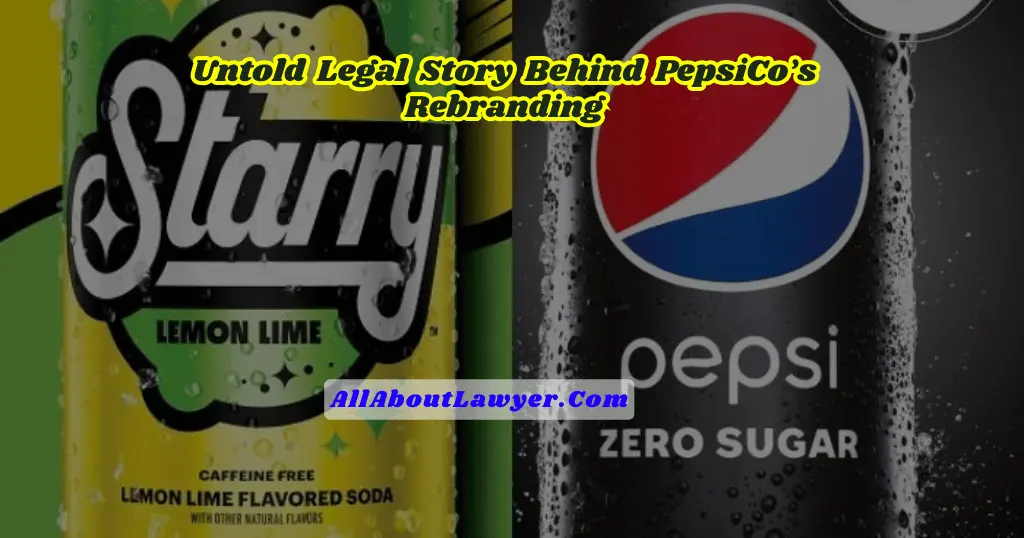Sierra Mist Lawsuit | Untold Legal Story Behind PepsiCo’s Rebranding
When you think of iconic sodas, the name Sierra Mist likely comes to mind, as it was one of PepsiCo’s flagship lemon-lime soft drinks. However, not only did Sierra Mist fail to capture market share against rivals like Sprite and 7UP, it has recently found itself at the center of a legal controversy. Today, we are diving deep into the Sierra Mist lawsuit that has rocked both the beverage and legal worlds, sparking discussions about branding, corporate responsibility, and consumer protection.
Table of Contents

Legal Backdrop of the Sierra Mist Lawsuit
The Sierra Mist lawsuit stems from accusations surrounding the marketing and branding strategies used by PepsiCo. The primary claims revolve around deceptive advertising and misrepresentation of the product’s ingredients. As consumers grow increasingly vigilant about health claims and ingredient transparency, companies like PepsiCo face rising pressure to ensure their marketing practices align with reality.
I remember back in the day, people drew a line in the sand when it came to their loyalty between Pepsi and Coke. But did that loyalty extend beyond their main soft drinks and into their related products like Sierra Mist? While I’m personally a Sprite fan, it’s important to recognize how Sierra Mist had its own loyal consumer base, many of whom feel betrayed by the legal developments that are currently unfolding.
But here’s where it gets interesting. Are you ready for some legal tea? Let’s dig into the specifics of what’s going on, but from a legal standpoint.
Rebranding of Sierra Mist: What Triggered the Lawsuit?
It’s worth noting that Sierra Mist was rebranded to Mist Twist in 2016, only to be discontinued and replaced by PepsiCo’s new soft drink, Starry, in 2023. This rebranding was seen by many as a strategic business decision to revitalize a brand that was struggling to compete. But an even more intriguing claim surfaced with an influencer named Cierra Mistt (yes, that’s right, spelled with a “C” instead of an “S” and two “T’s”). She alleges that she played a role in PepsiCo’s rebranding of Sierra Mist after receiving a cease-and-desist letter accusing her of infringing on their trademark.
According to Cierra Mistt, the letter demanded that she stop using the name because it didn’t “align with PepsiCo’s brand values.” After looking into the trademark, she claimed that PepsiCo’s rights to the Sierra Mist trademark had expired. But here’s where things go wrong in her story: she misunderstood the difference between trademarks and copyrights. In her version of events, she suggested that PepsiCo’s trademark had expired, which is simply inaccurate.

Let’s clarify this: trademarks protect names, logos, and symbols used in commerce, while copyrights protect creative works like music, books, or artwork. And no, you can’t just “buy” an expired trademark. There are legal procedures and common-law rights that allow businesses like PepsiCo to maintain rights even if they don’t renew a trademark registration. In this case, Sierra Mist still held its trademark, debunking the influencer’s claims.
Trademark Misunderstandings in the Sierra Mist Lawsuit
As explained by LaConya Murray, an intellectual property attorney, there are several issues with Cierra Mistt’s allegations. First, even if a trademark expires, that doesn’t mean it can no longer be used by the original company. In the U.S., common law trademark rights allow a company to retain rights over a name if they continue using it in commerce. Additionally, trademarks must be renewed every 10 years, but even after expiration, a grace period can often be granted for renewal.
What’s even more important is that PepsiCo actually still holds several active trademarks for Sierra Mist, despite having rebranded the drink to Starry. According to Bloomberg, Sierra Mist only held 0.1% of the U.S. soda market, while Sprite boasted a 7% share in a market worth a staggering $82 billion . With such a minimal market share, it made sense for PepsiCo to shift strategies, but the notion that an influencer’s actions led to the Sierra Mist rebranding simply doesn’t hold up under legal scrutiny.
Sierra Mist Lawsuit: False Advertising Claims and Ingredient Controversies
At the heart of the Sierra Mist lawsuit are claims related to misleading advertising. Consumers allege that PepsiCo misrepresented Sierra Mist as a healthier, more natural alternative to other sodas, despite containing high fructose corn syrup and other artificial additives. This form of false advertising has become increasingly common in the food and beverage industry, where words like “natural” and “organic” can be used misleadingly to attract health-conscious consumers.
Health Concerns and Consumer Protection in the Sierra Mist Lawsuit
Consumer advocates argue that Sierra Mist failed to live up to the expectations it set for health-conscious consumers. The lawsuit claims that PepsiCo capitalized on the trend toward more natural and healthier beverages but failed to deliver a product that matched its claims. The soda contained high amounts of sugar and artificial ingredients, which went against its marketing as a refreshing, natural alternative.
One thing is for sure: whether or not these allegations hold water, the Sierra Mist lawsuit has left a dent in PepsiCo’s reputation, forcing the company to reconsider its marketing strategies. Just as we’ve seen with other major brands, consumer backlash and class action lawsuits have become common tools for holding corporations accountable.
Influencer Allegations and Trademark Laws: What Went Wrong?
As previously mentioned, the Sierra Mist lawsuit took an unexpected turn when influencer Cierra Mistt claimed to be the catalyst for the product’s rebranding. But there are many issues with her story, particularly her misunderstanding of trademark law. According to LaConya Murray, a registered trademark attorney, trademarks don’t simply expire without recourse for the owner. There are specific timelines for renewing trademarks, and even expired trademarks can be revived if the brand is still in active use.
This misstep in understanding led to her claim that she had “purchased” the expired trademark, which is not how intellectual property law works. PepsiCo continues to maintain active trademarks for Sierra Mist through common-law usage and proper renewal filings.
The Rebranding of Sierra Mist: Enter Starry
Given that Sierra Mist only accounted for 0.2% of PepsiCo’s total revenue, it was clear that the brand wasn’t performing well. This led to the development of Starry, a new lemon-lime soda designed to replace Sierra Mist. According to Bloomberg, Starry not only boasts a different flavor profile but also represents a fresh start for PepsiCo in a market dominated by Sprite .
Starry had been in development for several years before its 2023 launch, with the intent-to-use trademark for Starry being filed back in 2019. This intent-to-use application gave PepsiCo priority over others who might try to use the same name while they prepared the product for market launch.
Conclusion: Lessons from the Sierra Mist Lawsuit
The Sierra Mist lawsuit serves as a crucial lesson for both companies and consumers. It emphasizes the importance of accurate marketing and trademark enforcement in a world where intellectual property is constantly under scrutiny. It also shows how companies must adapt to changing consumer preferences while maintaining transparency about their products.
For consumers, it’s a reminder to be vigilant about the products they purchase and the claims made by brands. PepsiCo’s decision to discontinue Sierra Mist and launch Starry reflects the evolving landscape of the beverage industry, where health concerns and brand loyalty play a pivotal role.
Also Read: Erle Stanley Gardner and Other Legendary Trial Lawyers Who Shaped Legal History
FAQs
What is the Sierra Mist lawsuit about?
The Sierra Mist lawsuit involves allegations of false advertising and misleading ingredient claims related to the soda’s “natural” branding.
Is Sierra Mist still available?
No, Sierra Mist has been discontinued and replaced by Starry.
What are the key legal issues in the Sierra Mist lawsuit?
The main legal issues include misleading advertising, trademark rights, and product transparency.
How does the Sierra Mist lawsuit impact PepsiCo’s brand?
The lawsuit has led to consumer distrust and prompted a rebranding to Starry, but PepsiCo still holds active trademarks for Sierra Mist.
What can consumers learn from this lawsuit?
The lawsuit highlights the need for consumers to read labels carefully and understand trademark law when it comes to brand identity
About the Author

Sarah Klein, JD, is a licensed attorney and legal content strategist with over 12 years of experience across civil, criminal, family, and regulatory law. At All About Lawyer, she covers a wide range of legal topics — from high-profile lawsuits and courtroom stories to state traffic laws and everyday legal questions — all with a focus on accuracy, clarity, and public understanding.
Her writing blends real legal insight with plain-English explanations, helping readers stay informed and legally aware.
Read more about Sarah
